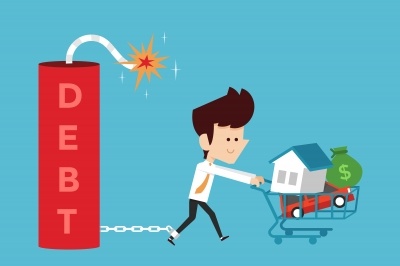 People have difficulty paying their mortgage for a variety of reasons. They lose their job, get divorced, or incur costly medical bills, to name a just a few common hardships. To make ends meet when a hardship happens, some are able to reduce spending on nonessential items like entertainment, vacations, and eating out. If that's not enough, things that are necessary, but can be put off, are. If reducing spending does not free up enough cash to pay for essentials like mortgage, car, and utility payments, tough decisions have to be made.
People have difficulty paying their mortgage for a variety of reasons. They lose their job, get divorced, or incur costly medical bills, to name a just a few common hardships. To make ends meet when a hardship happens, some are able to reduce spending on nonessential items like entertainment, vacations, and eating out. If that's not enough, things that are necessary, but can be put off, are. If reducing spending does not free up enough cash to pay for essentials like mortgage, car, and utility payments, tough decisions have to be made.
Each person who has been in that challenging situation has their own logic as far as what bills to prioritize. Some have made car payments a priority over mortgage payments, reasoning that they could sleep in their car if they had to, but they couldn't drive their house to work. Whatever is decided, there are no easy choices.
Not having enough money to pay for essential bills is a difficult situation that drives people to develop physical ailments, stress, and even commit suicide. But it doesn't have to be that way. Many people have survived personal and financial tragedies and rebuilt a happy, prosperous life for themselves. To give yourself the best chance of being in the latter group, start evaluating the possibilities, even the worst case ones, as soon as possible. Every course of action has to be on the table, from bankruptcy to foreclosure and beyond. But how do you even know where to start?
Do Some Research
 Before making any decisions on what to do about your home loan, gather all the information you can. Start asking questions, and think about what your goals are. Do you want to keep your home? What kind of mortgage do you have? Is your home underwater? If so, how much? Could you afford the home if the payments were lower? What do your career and earning prospects look like? Have you spoken to your servicer, and can they help? Have you been served foreclosure papers? Do you have a sale date? The answers to these questions determine what options you can consider, and where you should look for assistance. First, take a few minutes to educate yourself on the ways other people in your situation have been taken advantage of so it doesn't happen to you.
Before making any decisions on what to do about your home loan, gather all the information you can. Start asking questions, and think about what your goals are. Do you want to keep your home? What kind of mortgage do you have? Is your home underwater? If so, how much? Could you afford the home if the payments were lower? What do your career and earning prospects look like? Have you spoken to your servicer, and can they help? Have you been served foreclosure papers? Do you have a sale date? The answers to these questions determine what options you can consider, and where you should look for assistance. First, take a few minutes to educate yourself on the ways other people in your situation have been taken advantage of so it doesn't happen to you.
Watch Out For Scams
An important point to research is what scams are out in the world that target people in your situation. Being taken advantage of by a con artist, in what is already one of the most difficult situations in your life, will only make things worse. Don't let your desire to get what you want blind you to the reality that there are con artists willing to tell you whatever you want to hear to get you to hand over your money. With over six million foreclosures and counting since 2008, there are quite a few unethical entrepreneurs dedicated to taking advantage of distressed homeowners. Some of the common scams are:
- Bait and Switch: In this scam the fraudsters will offer you a loan to help you get caught up on your mortgage payments, but the paperwork you sign includes documents that transfers ownership of your home to them. Then you get evicted. Nice doing business with you.
- Rent-to-Buy: Perpetrators of the rent-to-buy fraud encourage homeowners to make a deal to surrender the title to their home, stay in the home as renters, and then buy it back. They say that a new borrower with better credit and financing will be able to rent your home to you at an affordable rate. However, it is often too expensive for you to buy back the home, and if the new owner is foreclosed, you're evicted.
- Phony Counseling Services: These scammers say that, for a fee, they'll negotiate with your lender to get you a lower monthly payment or take some other action to save your home. Sometimes they will tell you not to contact your lender or lawyer, which is a giant red flag. They say they will take care of everything as soon as you get them their fee, then they ask for more money or disappear. There are legitimate counseling agencies but they would never advise you not to talk to your lawyer or lender, or to give them your mortgage payment.
Consider Alternatives To Foreclosure
If you don't want to, or can't afford to keep your home under any circumstance, you need to consider the alternatives to foreclosure:
- Short Sale: A short sale is when the bank agrees to allow you to sell your home for less than what you owe on the loan. You should make sure that you get the bank to sign a deficiency judgment waiver that absolves you of the deficient amount (loan balance – sale price).
- Deed in lieu of foreclosure: This is an agreement for the borrower to transfer ownership of the property to the bank in exchange for canceling the loan. You'll also want to get a deficiency waiver for this agreement.
- Strategic default: This is a term that applies to homeowners who choose to stop paying their mortgage and let foreclosure happen even though they could afford to make the payment. It's also called 'jingle mail,' as in mailing your house keys to the bank. It's done because the property is deep underwater and there's no hope of reducing the principal. This can be a dangerous option because foreclosure may not happen as soon as you expect it to, and you could have a zombie on your hands. Actually, the zombie will be on your tax bill and credit, and that's much, much worse than any brain-eating creature.
- Cash for Keys: This is like a deed in lieu of foreclosure agreement except that the bank gives you money to leave the property within a certain period of time, and in acceptable condition.
Is A Loan Modification The Best Option For You?
If you do want to keep your home, but have experienced a hardship, and need a more affordable payment, consider applying for a loan modification. It involves a permanent change to one or more terms of your mortgage loan, such as the interest rate, loan duration, principal amount, or monthly payment. You are required to submit multiple financial documents and a hardship letter as part of the application. A successful loan modification requires you to show that you experienced a hardship that caused you to fall behind on your payments, and that the hardship is now over, and you'll be able to afford your payments after the loan is modified.
Loan modification is the only option that allows a homeowner to keep their home and possibly reduce the principal they owe. Federal rules require the banks to seriously consider your loan modification application, and restrict their ability to dual-track you, which is considering a loan modification while simultaneously pursuing foreclosure. Anyone who has an unaffordable mortgage payment and wishes to keep their home should give thought to applying for a loan modification.
Whether you decide to pursue an alternative to foreclosure, loan modification, or something else, it's important to work with someone who is knowledgeable and has a record of helping people in your situation. For homeowners behind on their mortgage, an experienced attorney is the best person for the job. They are much more affordable than you might think, and the money and headache they can save you is much greater than the fee for their services.
Images courtesy of bplanet and Photokanok at FreeDigitalPhotos.net










